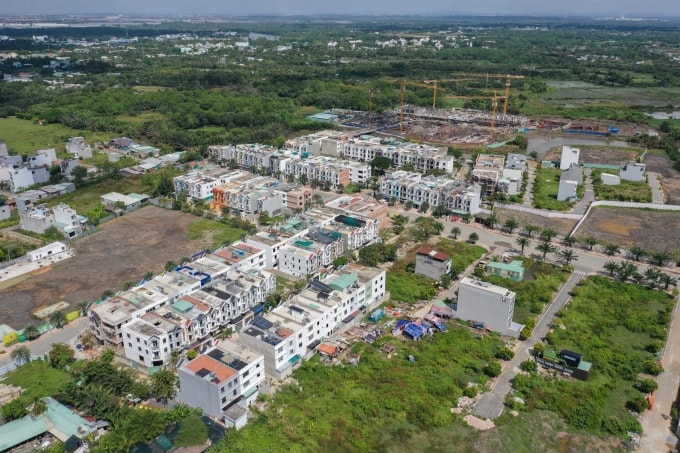Despite many expectations, the social housing development project in 2024 continues to stagnate, reaching only 16% of the plan.

In 2022, at the government's call, 21 leading enterprises registered to implement a project to develop more than 1 million social housing units. The project aims to develop 130,000 units nationwide by 2024. However, a report from the Ministry of Construction shows that despite efforts, provinces and cities have only completed 21,000 units, equivalent to more than 16% of the plan.
Ho Chi Minh City and Hanoi are leading in construction targets, but so far the progress has only reached 21% and 37%. In the whole year, the two largest cities in the country only had one social housing project for rent licensed for construction.
This situation also occurs in other localities such as Binh Duong (reaching 37% of the plan); Dong Nai (reaching 16%). Some places have high demand for social housing but no projects have been completed such as Thai Nguyen, Ninh Binh, Nam Dinh, Thua Thien Hue, Vinh Long, Ben Tre, Bac Lieu, Ca Mau.
When building social housing, businesses are exempted from land use fees, reduced value-added tax, corporate income tax, and have the opportunity to access preferential business loans... However, many plans are still "on paper".
Despite the incentives, from the perspective of a business, Mr. Le Huu Nghia, General Director of Le Thanh Real Estate Company, said that building social housing still "encounters many difficulties". He explained that the profit limit of 10% is too low when the procedures take up to 5 years, and the investment phase takes another 2 years. That is, an average project takes 7 years. On average, during these 7 years, the profit each year is only about 1.3-1.5%, which, according to Mr. Nghia, is not enough for reinvestment. Therefore, many businesses do not want to continue after completing a project.
Mr. Truong Anh Tuan, Chairman of Hoang Quan Group, which is implementing dozens of social housing projects across the country, said the difficulty lies not only in the limited profits but also in the complicated legal procedures. According to him, building social housing requires more effort than building commercial housing, and the risk of losing capital is very high. If there is not enough counterpart capital, it is easy to default.
From the perspective of the management agency, Mr. Nguyen Van Hoan, Deputy Head of the Housing Development and Real Estate Market Department, Ho Chi Minh City Department of Construction, also acknowledged that the city is still stuck in the process. Investors have to go through many complicated procedures from different agencies and units. The investment policy approval process alone takes 1-2 years because it requires opinions from 10 related units. The overlap between steps leads to a prolonged project completion time, discouraging many businesses.
Another problem that businesses have "complained" about is that the land allocation for social housing projects in the past was not guaranteed and was unreasonable. Many localities do not have independent land funds to develop social housing, mainly relying on 20% of land funds in commercial housing projects, making it difficult for supply to break through. The procedure for selecting investors takes a long time, and preferential policies change constantly, so the rate of construction commencement and completion is low.
Mr. Phan Duc Hieu, Standing Member of the National Assembly Economic Committee, commented that building social housing for enterprises is "more difficult" than commercial housing, the source of support capital is mostly short- and medium-term credit packages, which are temporary and unsustainable. The implementation mechanism is still that enterprises invest their own capital but are limited in maximum profit.
To untie the supply and encourage businesses to participate in social housing, businesses believe that clearer regulations are needed to avoid inconsistencies between the old and new laws in the post-inspection stage.
Businesses want financial support policies for both investors and homebuyers. In addition to simplifying the approval process and shortening project implementation time, planning clean land in areas with high demand, such as industrial parks or export processing zones, is essential to ensure convenience for workers.
Dr. Can Van Luc, Chief Economist of BIDV Bank, said that to build social housing, there needs to be synchronous coordination between the State, businesses and people, in which the State plays the leading role, localities proactively plan land funds for social housing, and issue appropriate policies.
On the bank side, Mr. Luc proposed considering preferential loan interest rates for businesses with enough resources to develop social housing projects that ensure quality, complete ecosystems, no losses and make profits.
Social housing is expected to "explode" from 2025 when the new Land Law, Housing Law and Real Estate Business Law penetrate the market, untangling obstacles in developing this type of housing. Recently, the Prime Minister also requested ministries, branches and localities to promptly remove difficulties in procedures for building social housing. Regarding capital, the Government has proposed implementing a VND100,000 billion package for social housing loans from bond capital, creating a basis for lower interest rates than loans from commercial banks.
While many localities want to develop social housing, there is a lack of supply, people do not have houses, many completed projects are unoccupied and abandoned. One of the reasons is the quality of construction, the project is located too far from the center, inconvenient for transportation, poor social infrastructure, education, and public health...
TH (according to VnExpress)